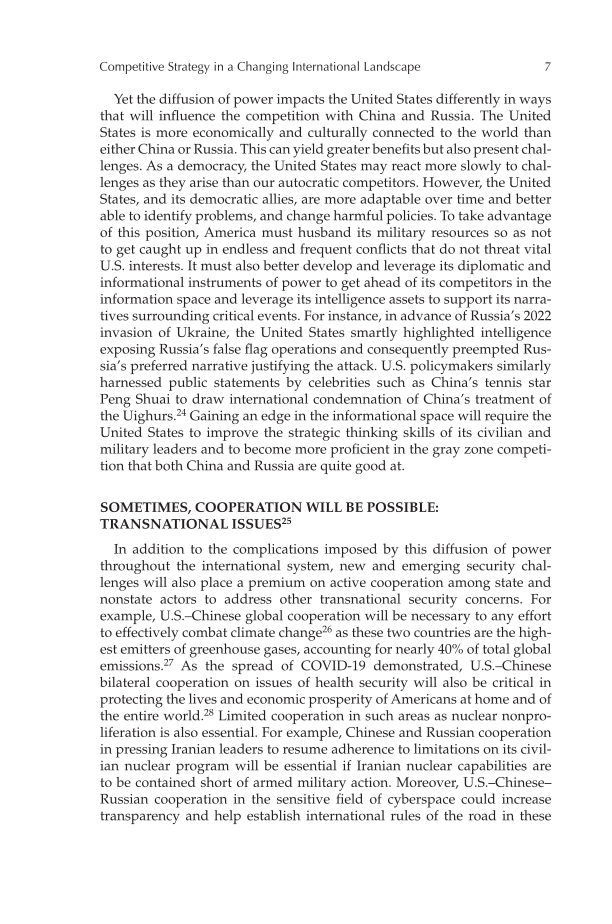Competitive Strategy in a Changing International Landscape 7 Yet the diffusion of power impacts the United States differently in ways that will influence the competition with China and Russia. The United States is more economically and culturally connected to the world than either China or Russia. This can yield greater benefits but also present chal- lenges. As a democracy, the United States may react more slowly to chal- lenges as they arise than our autocratic competitors. However, the United States, and its democratic allies, are more adaptable over time and better able to identify problems, and change harmful policies. To take advantage of this position, America must husband its military resources so as not to get caught up in endless and frequent conflicts that do not threat vital U.S. interests. It must also better develop and leverage its diplomatic and informational instruments of power to get ahead of its competitors in the information space and leverage its intelligence assets to support its narra- tives surrounding critical events. For instance, in advance of Russia’s 2022 invasion of Ukraine, the United States smartly highlighted intelligence exposing Russia’s false flag operations and consequently preempted Rus- sia’s preferred narrative justifying the attack. U.S. policymakers similarly harnessed public statements by celebrities such as China’s tennis star Peng Shuai to draw international condemnation of China’s treatment of the Uighurs.24 Gaining an edge in the informational space will require the United States to improve the strategic thinking skills of its civilian and military leaders and to become more proficient in the gray zone competi- tion that both China and Russia are quite good at. SOMETIMES, COOPERATION WILL BE POSSIBLE: TRANSNATIONAL ISSUES25 In addition to the complications imposed by this diffusion of power throughout the international system, new and emerging security chal- lenges will also place a premium on active cooperation among state and nonstate actors to address other transnational security concerns. For example, U.S.–Chinese global cooperation will be necessary to any effort to effectively combat climate change26 as these two countries are the high- est emitters of greenhouse gases, accounting for nearly 40% of total global emissions.27 As the spread of COVID-19 demonstrated, U.S.–Chinese bilateral cooperation on issues of health security will also be critical in protecting the lives and economic prosperity of Americans at home and of the entire world.28 Limited cooperation in such areas as nuclear nonpro- liferation is also essential. For example, Chinese and Russian cooperation in pressing Iranian leaders to resume adherence to limitations on its civil- ian nuclear program will be essential if Iranian nuclear capabilities are to be contained short of armed military action. Moreover, U.S.–Chinese– Russian cooperation in the sensitive field of cyberspace could increase transparency and help establish international rules of the road in these
Document Details My Account Print multiple pages
Print
You have printed 0 times in the last 24 hours.
Your print count will reset on at .
You may print 0 more time(s) before then.
You may print a maximum of 0 pages at a time.











































































































































































































































































































































































